congress
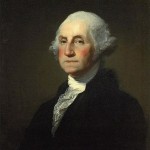 Long before James Madison became out fourth President of the United States, he served in a number of other positions. Early on, Madison emerged as an important leader in the House of Representatives and was a close adviser to President George Washington. While many of the early leaders of our nation understood and were prepared to fight for our freedom, they weren’t necessarily eloquent speakers or writers, but then again, many politicians today also have speech writers. I guess each felt the need to work on the important things, and delegate the rest. Since James Madison was well-known as an excellent writer, President Washington asked him to write a letter to Congress for him expressing that he was excited to work with them. Washington wasn’t the greatest wordsmith, and Madison was an excellent writer, so he had Madison do the job.
Long before James Madison became out fourth President of the United States, he served in a number of other positions. Early on, Madison emerged as an important leader in the House of Representatives and was a close adviser to President George Washington. While many of the early leaders of our nation understood and were prepared to fight for our freedom, they weren’t necessarily eloquent speakers or writers, but then again, many politicians today also have speech writers. I guess each felt the need to work on the important things, and delegate the rest. Since James Madison was well-known as an excellent writer, President Washington asked him to write a letter to Congress for him expressing that he was excited to work with them. Washington wasn’t the greatest wordsmith, and Madison was an excellent writer, so he had Madison do the job.
James Madison was excited to be a part of this first administration and wanted to give it his very best effort. So, in one of his first official actions under President George Washington, Madison wrote a beautiful letter to Congress. Congress was very impressed with the “letter from President Washington” and wanted to impress him with a letter of their own. So, naturally, they chose the best qualified person to write a response to President Washington…you guessed it, James Madison. So, Madison wrote a response to the original letter, that he wrote, saying that Congress was also very excited to be working with the president.
Under normal circumstances, you would expect that the two letters would be the end of the matter, and the new administration would proceed to get down to business. You would be wrong. President Washington decided to send a response to the response, and to make matters even more ludicrous, Congress sent a response to 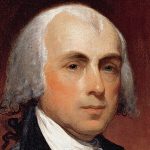 that response as well. As it turns out, and of course, Madison wrote those other letters too. So, all in all, Madison had a whole little conversation with himself by mail in the form of four separate letters. Of course, he still represented the president and congress, but it’s quite likely that no one actually read the letters before they were sent, or at least didn’t really read them carefully…not until the received them anyway. Nevertheless, James Madison wanted to do the very best job he could for both President Washington and for Congress. If he had not don’t an exceptional job, they would not ask for his help again, and his career could have been over. Somehow, I don’t think that was his real motive in writing the excellent letters. I think he wanted to be of good service to the president. Still in the end, Madison’s first official act for President Washington was to write four letters…to himself.
that response as well. As it turns out, and of course, Madison wrote those other letters too. So, all in all, Madison had a whole little conversation with himself by mail in the form of four separate letters. Of course, he still represented the president and congress, but it’s quite likely that no one actually read the letters before they were sent, or at least didn’t really read them carefully…not until the received them anyway. Nevertheless, James Madison wanted to do the very best job he could for both President Washington and for Congress. If he had not don’t an exceptional job, they would not ask for his help again, and his career could have been over. Somehow, I don’t think that was his real motive in writing the excellent letters. I think he wanted to be of good service to the president. Still in the end, Madison’s first official act for President Washington was to write four letters…to himself.
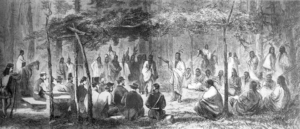 Actually, The Medicine Lodge Treaty is the name given for three treaties that were signed near Medicine Lodge, Kansas, between the Federal government of the United States and southern Plains Indian tribes on October 21, 1867. The treaties were intended to bring peace to the area by relocating the Native Americans to reservations in Indian Territory and away from European-American settlement. The Indian Peace Commission had concluded in its final report in 1868, that the wars were completely preventable. The commission determined that the United States government and its representatives, including the United States Congress, had contributed to the warfare on the Great Plains by failing to fulfill their legal obligations and to treat the Native Americans with honesty. This fact is not a new concept for anyone who has studied history at all.
Actually, The Medicine Lodge Treaty is the name given for three treaties that were signed near Medicine Lodge, Kansas, between the Federal government of the United States and southern Plains Indian tribes on October 21, 1867. The treaties were intended to bring peace to the area by relocating the Native Americans to reservations in Indian Territory and away from European-American settlement. The Indian Peace Commission had concluded in its final report in 1868, that the wars were completely preventable. The commission determined that the United States government and its representatives, including the United States Congress, had contributed to the warfare on the Great Plains by failing to fulfill their legal obligations and to treat the Native Americans with honesty. This fact is not a new concept for anyone who has studied history at all.
At the request of the tribal chiefs, the US government met the chiefs at a place traditional for Native American ceremonies. The first treaty was signed October 21, 1867, with the Kiowa and Comanche tribes. The second, with the Kiowa-Apache, was signed the same day. The third treaty was signed with the Southern Cheyenne and Arapaho on October 28, 1867. 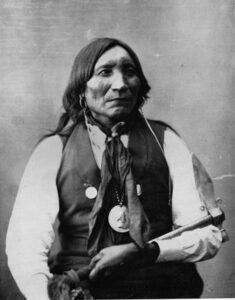
As expected, the Medicine Lodge Treaty, heavily favored the Congress and the white settlers. The tribes were assigned reservations of diminished size compared to the territories that had been defined in an 1865 treaty. The treaty tribes never actually ratified the treaty by vote of adult males…a requirement of the tribes. The Congress also changed the allotment policy under the Dawes Act and authorized sales under the Agreement with the Cheyenne and Arapaho (1890) and the Agreement with the Comanche, Kiowa and Apache (1892). With the agreement, signed with the Cherokee Commission, the Congress further reduced the reservation territory promised to the Indians. Lone Wolf, the Kiowa chief, immediately filed a lawsuit against the government for fraud on behalf of the tribes in Lone Wolf v. Hitchcock. The US Supreme Court ruled against the tribes in 1903, after determining that the Congress had “plenary power” and the political right to make such decisions. With the power of that decision to back them, Congress wasted no time in unilaterally acting in the same manner on land decisions related to other reservations as well.
Because of the outstanding issues with the treaty and subsequent government actions, in the mid-20th century, the Kiowa, Arapaho and Comanche filed several suits for claims against the US government. Over decades, they won substantial settlements of monetary compensation in the amount of tens of millions of dollars, although it 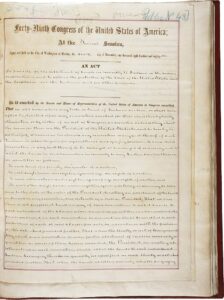
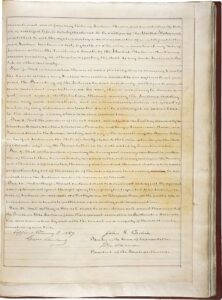 took years for the cases to be resolved.
took years for the cases to be resolved.
I don’t know what could have been done differently, exactly, other than to be completely fair with our treatment of the Indians. I have never liked the idea of forcing them to be on the reservations. The land they were given was far less than they should have received, and instead of letting them become members of society, where they could make an honest living, they were given compensation without the need to earn in, creating a group of people who could make no contribution to society at all. It basically took away their self-respect and their sense of worth…a situation which helped no one. The fighting continued until the last battle was fought on January 9, 1918.
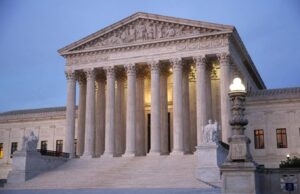 Our government is made up of three branches. The three branches of the United States government are the legislative, executive, and judicial branches. According to the doctrine of separation of powers, the United States Constitution distributed the power of the federal government among these three branches and built a system of checks and balances to ensure that no one branch could become too powerful. This is a long-standing system that has served the United States well, as long as it isn’t being abused.
Our government is made up of three branches. The three branches of the United States government are the legislative, executive, and judicial branches. According to the doctrine of separation of powers, the United States Constitution distributed the power of the federal government among these three branches and built a system of checks and balances to ensure that no one branch could become too powerful. This is a long-standing system that has served the United States well, as long as it isn’t being abused.
The judicial branch came into being when The Judiciary Act of 1789 was passed by Congress and signed by President George Washington, establishing the Supreme Court of the United States as a tribunal made up of six justices who were to serve on the court until death or retirement. Sometimes I’m not sure how I feel about the “until death or retirement” part, but I’m sure they had their reasons. To me, there are some justices, like some members of congress who far outstay their welcome. Nevertheless, on that day, President Washington nominated John Jay to preside as chief justice. He further named John Rutledge, William Cushing, John Blair, Robert Harrison, and James Wilson to be associate justices. On September 26, all six appointments were confirmed by the US Senate, and with that, we had our first Supreme Court. 
The US Supreme Court was established by Article 3 of the US Constitution. Article 3 granted the Supreme Court ultimate jurisdiction over all laws, especially those in which their constitutionality was at issue. In addition, the high court was also designated to oversee cases concerning treaties of the United States, foreign diplomats, admiralty practice, and maritime jurisdiction. The first session of the US Supreme Court was held on February 1, 1790, in New York City’s Royal Exchange Building.
The US Supreme Court quickly grew into the most important judicial body in the world in terms of its central place in the American political order. The Constitution allows Congress to set the size of the court…another part of the system that I don’t think I agree with, simply because a corrupt congress could take advantage of that ability by stacking the courts to rule in their favor. I’m sure that Washington and the founding fathers planned for the justices to be honest and trustworthy. I’m sure too, that the fact that they were Supreme Courts justices for life or until retirement, was planned to allow them to make their rulings without fear of being fired. Of course, there is more that one way to get a justice removed, because dead can come by more than one means, including murder. And justices could be threatened or have 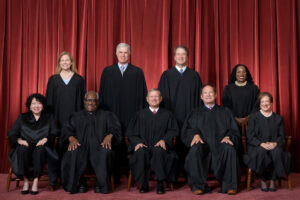 their families threatened, causing them to vote in a specific way. In a perfect world, justices would act according to the Constitution, and vote their conscience, bringing about an honest and fair ruling, but that is not always the case…sadly. The number of justices varied during the 19th century before stabilizing in 1869 at nine. While this number can be changed at any time by Congress, so far, it has not, and I believe that the Constitution should be amended to make the number nine, permanent. In times of constitutional crisis, the Supreme Court has always played a definitive role in resolving, for better or worse, the great issues of the time, and the number nine has worked well. It should not be changed.
their families threatened, causing them to vote in a specific way. In a perfect world, justices would act according to the Constitution, and vote their conscience, bringing about an honest and fair ruling, but that is not always the case…sadly. The number of justices varied during the 19th century before stabilizing in 1869 at nine. While this number can be changed at any time by Congress, so far, it has not, and I believe that the Constitution should be amended to make the number nine, permanent. In times of constitutional crisis, the Supreme Court has always played a definitive role in resolving, for better or worse, the great issues of the time, and the number nine has worked well. It should not be changed.
 Politics is always a dirty game. That is probably why most of us don’t like career politicians. They will do or say anything to win or further their careers. “Dirty politics” has been around as long as there have been politicians…and politics isn’t even limited to just politicians. There’s office politics, military politics, law enforcement politics, and more.
Politics is always a dirty game. That is probably why most of us don’t like career politicians. They will do or say anything to win or further their careers. “Dirty politics” has been around as long as there have been politicians…and politics isn’t even limited to just politicians. There’s office politics, military politics, law enforcement politics, and more.
General George Washington wasn’t even exempt. In October 1777, while serving as the commander of the Continental Army, Washington was informed of a conspiracy to discredit him with Congress and have him replaced by General Horatio Gates. The loosely organized attempt was supposedly led by Brigadier General Thomas Conway, who was an Irish member of the French army. Conway commanded a brigade in Washington’s army, and he was unhappy with Washington’s performance in the Battle of Brandywine. Conway was also bragging about his own feats at the same operation. Conway was even so bold as to request a promotion for himself, to the rank of major general…based on the merits of his “performance” in the battle. Washington protested Conway’s promotion and was irritated by the request, believing it would have disastrous effects on the morale of more senior officers. I think the biggest problem was the arrogance of Conway. It just isn’t right to brag on yourslf so much.
Thomas Conway, would be made inspector general of the United States less than two months later on December 14, but it is my belief that it was in an effort to pigeon-hole hime, because he was an embarrassment. Conway, was born in Ireland, but raised in France. He entered the French army in 1749. Silas Deane, the American ambassador to France, recruited Conway to the Patriot cause. Conway met with Washington at Morristown in May 1777, after which, he was appointed brigadier general and assigned to Major General John Sullivan’s division. Conway served admirably under Sullivan at the battles of Brandywine, in September 1777, and Germantown, in October 1777, before becoming involved in an unconfirmed conspiracy to remove General Washington from command of the Continental Army. It ruined his military career.

Conway wasn’t alone in the cabal. The Continental Army had suffered several defeats in the fall of 1777, and some members of Congress felt it was Washington’s leadership that was to blame. Conway began writing letters to prominent leaders, including General Horatio Gates, that were critical of Washington. After Washington got wind of Conway’s letter to General Gates, he wrote his own letter to Congress in January 1778. Conway was embarrassed, and in March 1778, he offered his resignation as an apology. Nevertheless, he was surprised and humiliated when Congress accepted. After General John Cadwalader wounded him in a duel defending Washington’s honor, Conway returned to France, where he died in exile in 1800…unable to recover his dignity after the horrific Conway Cabal.
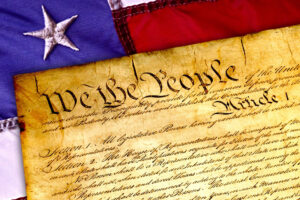
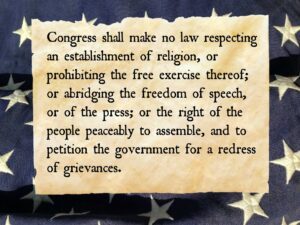 On this day, in 1787…the first Constitution Day, The Constitution of the Unites States of America was signed. It was a very important, and almost sacred day in our nations history. In fact, I believe that our nation was founded on Judeo-Christian values, and therefore our Constitution is a sacred document. The Constitution, which begins with “We the People of the United States, in Order to form a more perfect Union, establish Justice, insure domestic Tranquility, provide for the common defense, promote the general Welfare, and secure the Blessings of Liberty to ourselves and our Posterity, do ordain and establish this Constitution for the United States of America,” specifically “secures Liberty.” So many people these days don’t understand what it means to secure liberty, but the word is defined as “the state of being free within society from oppressive restrictions imposed by authority on one’s way of life, behavior, or political views.” When I read that definition, I am reminded of so many rules, regulations, and mandates we are currently living under, and I realize that as our current congress works very hard to tear down our Constitution, our nation is in danger of losing the Liberty we love so dearly.
On this day, in 1787…the first Constitution Day, The Constitution of the Unites States of America was signed. It was a very important, and almost sacred day in our nations history. In fact, I believe that our nation was founded on Judeo-Christian values, and therefore our Constitution is a sacred document. The Constitution, which begins with “We the People of the United States, in Order to form a more perfect Union, establish Justice, insure domestic Tranquility, provide for the common defense, promote the general Welfare, and secure the Blessings of Liberty to ourselves and our Posterity, do ordain and establish this Constitution for the United States of America,” specifically “secures Liberty.” So many people these days don’t understand what it means to secure liberty, but the word is defined as “the state of being free within society from oppressive restrictions imposed by authority on one’s way of life, behavior, or political views.” When I read that definition, I am reminded of so many rules, regulations, and mandates we are currently living under, and I realize that as our current congress works very hard to tear down our Constitution, our nation is in danger of losing the Liberty we love so dearly.
I don’t know about you, but I don’t like having someone tell me that I can’t attend church, because it is necessary to close down the churches. When the Covid-19 Pandemic started, the churches suddenly became non-essential, and that is criminal as per the First Amendment of our Constitution, “Congress shall make no law respecting an establishment of religion, or prohibiting the free exercise thereof; or abridging the freedom of speech, or of the press; or the right of the people peaceably to assemble, and to petition the Government for a redress of grievances.” The closing of our churches (my church thankfully refused to comply, and we were one of the few churches that never shut down) was a criminal act imposed on the people of the United States by our own government, and most churches and people allowed it. I read somewhere that “If you allow the government to break the law because of an emergency, they will always create an emergency to break the law.” That is a true statement and really should be a scary statement. The old saying, “if you give them an inch, they will take a mile” comes to mind, when I think of our government.
The reality is that Covid-19, while a serious virus, is usually survivable, and we have lived through many other “serious” viruses without lockdowns or mask mandates. People need to be allowed to make their own choices. For those who want to wear a mask, it should be accepted by everyone around that person. I would further say that if a person has chosen to wear a mask, the common sense rule that should follow is…keep your distance from them, as a courtesy. If a person doesn’t choose to wear a mask, then we have to accept their right to make their own choices concerning their own health. On thing that has seriously confused me concerning the mask mandates is that children under two and those with medical reasons that make it hard for them to wear a mask, are exempt. Now I get that a person who has difficulty breathing with a mask should be able to say “no” to the mask, but when I see a masked parent with an unmasked child, I see a recipe for a case of Covid in the child. Now I could be wrong, but doesn’t that child breathe the same air as their parent does. Sorry folks, that one makes no sense to me. If the parent is concerned for their own health and therefore wears a mask, they should be just as concerned for their child’s health and either mask the child, or put them in a protective bubble or maybe like the little wagons people pull behind their bicycles. At least that way they are attempting to protect the child from the virus they are so very afraid of.
Whew!! I have a feeling that I am going to hear it on this blog, but before you go after my views, I would recommend that you take a few minutes to give some serious thought to what I am saying here. We have become so afraid of a “bug” that we are no longer thinking rationally. Our businesses are closing down…permanently, because they can’t have customers inside, and yet they are supposed to pay rent and taxes. Our children missed between two months and a year of school, and even with online classes they are clearly behind where they should be at this point in their schooling. Landlords are going under, because while their tenants are exempt from paying rent and cannot be evicted, the mortgage payment is still due. And the one that started it all in my rant, churches have been closed down for as long as a year, some never to re-open again.
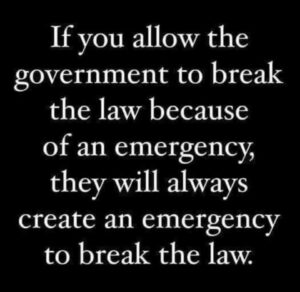
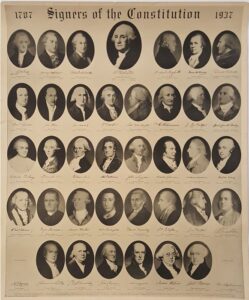
We are a relatively healthy nation of relatively smart people, who have been taking care of ourselves successfully for most of our adult lives, so why is it that suddenly, we are incapable of making the decisions necessary to continue to live healthy lives? We have to stop allowing our government to rule over us like dictators…stealing our liberty. We have to wake up!! And I don’t mean “woke” up!! We have to take a stand for America and for the world. On this Constitution Day, I invite you to take a look at the document our forefathers wrote, and see what it really says for yourself. You will be amazed.
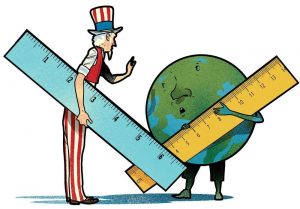 The metric system…in many ways, a source of contention between the American government, or whoever it is who keeps trying to push it on the American public, and the American public in general. Sure, it’s mixed in with our way of life, but somehow, it’s not something that most of us really understand very well. It’s like a strange foreign language, that no one wanted to learn in the first place…but somebody told us that it was important, better, more efficient…or some other such nonsense. It’s perfectly acceptable to use the metric system in the United States…in fact, Congress originally authorized its use in 1866 and has repeatedly tried to make it accepted in the years since, but the American public has continued to reject it.
The metric system…in many ways, a source of contention between the American government, or whoever it is who keeps trying to push it on the American public, and the American public in general. Sure, it’s mixed in with our way of life, but somehow, it’s not something that most of us really understand very well. It’s like a strange foreign language, that no one wanted to learn in the first place…but somebody told us that it was important, better, more efficient…or some other such nonsense. It’s perfectly acceptable to use the metric system in the United States…in fact, Congress originally authorized its use in 1866 and has repeatedly tried to make it accepted in the years since, but the American public has continued to reject it.
Although the government now requires metric use in some public sectors and strongly encourages it in many  private industries, but the American public never really took to the system and largely dismissed it, making the United States the only industrialized nation where that’s the case. These days the medical field exclusively uses it in their jobs, but when a nurse takes your temperature and tells you that it is 38° C, and you ask her how much that is in “English,” most of them have no idea that it is 101° F. Yes, they know that you are running a fever, but seriously, when you are running a fever, do you want to have to get out your nearest conversion table to figure out how high it is. Most of us know that normal is 98.6° F, but when you don’t feel good, the last thing you want to do is math. I don’t know who came up with inches and centimeters, or Celsius and Fahrenheit battle, but up until 1866, the United States knew what their measurements meant. We didn’t have to try to sit down and figure it all out. Why should we have to now? In American, it just doesn’t measure up.
private industries, but the American public never really took to the system and largely dismissed it, making the United States the only industrialized nation where that’s the case. These days the medical field exclusively uses it in their jobs, but when a nurse takes your temperature and tells you that it is 38° C, and you ask her how much that is in “English,” most of them have no idea that it is 101° F. Yes, they know that you are running a fever, but seriously, when you are running a fever, do you want to have to get out your nearest conversion table to figure out how high it is. Most of us know that normal is 98.6° F, but when you don’t feel good, the last thing you want to do is math. I don’t know who came up with inches and centimeters, or Celsius and Fahrenheit battle, but up until 1866, the United States knew what their measurements meant. We didn’t have to try to sit down and figure it all out. Why should we have to now? In American, it just doesn’t measure up.
So, in the next act of “pushiness,” Congress even passed a Metric Conversion Act of 1975 and set up a U.S.  Metric Board to take care of all the planning for the desired transition, but they apparently didn’t empower the board with enough authority, and the American people essentially said, “no” to adopting metric system, and continued on with their miles, pounds, ounces and all the rest. Similarly lackluster efforts since then have done little to get Americans to change their minds. We are a stubborn people, and we don’t really like it when someone tells us that, what we have always known as white, is now black. That simply makes no sense, and just because Congress tells us that it does, doesn’t mean that it is so. I don’t suppose that the failed metric conversion will be the last thing that Congress tries to push on us, that will end up in the junk heap…do you?
Metric Board to take care of all the planning for the desired transition, but they apparently didn’t empower the board with enough authority, and the American people essentially said, “no” to adopting metric system, and continued on with their miles, pounds, ounces and all the rest. Similarly lackluster efforts since then have done little to get Americans to change their minds. We are a stubborn people, and we don’t really like it when someone tells us that, what we have always known as white, is now black. That simply makes no sense, and just because Congress tells us that it does, doesn’t mean that it is so. I don’t suppose that the failed metric conversion will be the last thing that Congress tries to push on us, that will end up in the junk heap…do you?
 For anyone who has watched the process of getting a bill made law in Congress, the word Veto is a well known word. If the president doesn’t like the bill, he can always threaten to veto it, forcing Congress to get a two-thirds majority vote in both the House of Representatives and in the Senate to override his presidential veto. The exact number depends on how many representatives vote, so the actual number is subject to change. The word veto is Latin for I forbid, and it is the power used to unilaterally stop an official action, especially the enactment of legislation. Therefore, if the president doesn’t like the bill, even if it has passed the House and Senate, he can veto it to see if he can keep it from being passed on a second vote.
For anyone who has watched the process of getting a bill made law in Congress, the word Veto is a well known word. If the president doesn’t like the bill, he can always threaten to veto it, forcing Congress to get a two-thirds majority vote in both the House of Representatives and in the Senate to override his presidential veto. The exact number depends on how many representatives vote, so the actual number is subject to change. The word veto is Latin for I forbid, and it is the power used to unilaterally stop an official action, especially the enactment of legislation. Therefore, if the president doesn’t like the bill, even if it has passed the House and Senate, he can veto it to see if he can keep it from being passed on a second vote.
The first veto ever exercised was by President George Washington on April 5, 1792. The bill introduced a new plan for dividing seats in the House of Representatives that would have increased the amount of seats for northern states. After consulting with his politically divided and contentious cabinet, President Washington, who came from the southern state of Virginia, ultimately decided that the plan was unconstitutional because it provided for additional representatives for some states, and it would have introduced a number of representatives higher than that allowed by the Constitution. After a discussion with 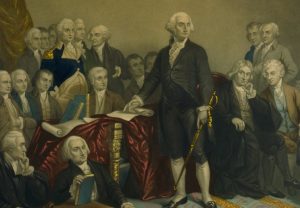 the president, Thomas Jefferson wrote in a letter that votes for or against the bill were divided along perfectly geographical lines between the North and South. Jefferson observed that Washington feared that a veto would incorrectly portray him as biased toward the South. In the end, Jefferson was able to convince the president to veto the bill on the grounds that it was unconstitutional and introduced principles that were liable to be abused in the future. Jefferson suggested apportionment instead be derived from “arithmetical operation, about which no two men can ever possibly differ.” With Washington’s veto, the bill was sent back to Congress. Though representatives could have attempted to overrule the veto with a two-thirds vote, Congress instead threw out the original bill and instituted a new one that apportioned representatives at “the ratio of one for every thirty-three thousand persons in the respective States.” That is a much more fair plan, in my opinion. George Washington would go on to veto one more bill during his time in office. In February 1797, the former commanding general of the Continental Army vetoed an act that would have reduced the number of cavalry units in the army. Neither of the vetoes were overridden by Congress.
the president, Thomas Jefferson wrote in a letter that votes for or against the bill were divided along perfectly geographical lines between the North and South. Jefferson observed that Washington feared that a veto would incorrectly portray him as biased toward the South. In the end, Jefferson was able to convince the president to veto the bill on the grounds that it was unconstitutional and introduced principles that were liable to be abused in the future. Jefferson suggested apportionment instead be derived from “arithmetical operation, about which no two men can ever possibly differ.” With Washington’s veto, the bill was sent back to Congress. Though representatives could have attempted to overrule the veto with a two-thirds vote, Congress instead threw out the original bill and instituted a new one that apportioned representatives at “the ratio of one for every thirty-three thousand persons in the respective States.” That is a much more fair plan, in my opinion. George Washington would go on to veto one more bill during his time in office. In February 1797, the former commanding general of the Continental Army vetoed an act that would have reduced the number of cavalry units in the army. Neither of the vetoes were overridden by Congress.
 Thirty six of the 45 presidents have vetoed at least one bill, with the most regular vetoes going to Franklin D Roosevelt with 372…seconded by Grover Cleveland with 346. There is also something called a pocket veto, which is basically when the president simply does nothing…refusing to sign it into law, or to veto it outright, and it was used by a number of presidents as well. That one seems strange to me, but it seems to have the same procedure to pass the bill into law that the regular veto does. Politics is a messy business, because with so many people involved, there is bound to be differing opinions on what should be done. Nevertheless, try as he might, while the buck might stop at the president’s office, the bill might not, but only if Congress can get its collective act together and vote to override a presidential veto.
Thirty six of the 45 presidents have vetoed at least one bill, with the most regular vetoes going to Franklin D Roosevelt with 372…seconded by Grover Cleveland with 346. There is also something called a pocket veto, which is basically when the president simply does nothing…refusing to sign it into law, or to veto it outright, and it was used by a number of presidents as well. That one seems strange to me, but it seems to have the same procedure to pass the bill into law that the regular veto does. Politics is a messy business, because with so many people involved, there is bound to be differing opinions on what should be done. Nevertheless, try as he might, while the buck might stop at the president’s office, the bill might not, but only if Congress can get its collective act together and vote to override a presidential veto.
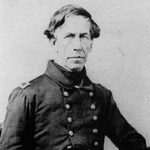
 Captain Charles Wilkes was an American naval officer, ship’s captain, and explorer. During an exploring expedition, authorized by the May 18, 1836 act of the Congress, Wilkes set out to explore the southern oceans. Congress didn’t expect his expedition to find anything amazing, but that is where they were wrong. His group set out in 1838, and it was during this expedition that Wilkes spotted the coast of Antarctica. The group had sailed around South America to the South Pacific, and after spotting Antarctica, decided to explore a 1,500 mile stretch of it’s eastern coast. The area later became known a Wilkes Land. In 1842, the expedition returned to New York, after having circumnavigated the globe. Wilkes wasn’t the first explorer to look at Antarctica, however. It was discovered by European and American explorers, and in the February 1821, American John Davis became the first person to land on the continent, coming in at Hughes Bay on the Antarctic Peninsula.
Captain Charles Wilkes was an American naval officer, ship’s captain, and explorer. During an exploring expedition, authorized by the May 18, 1836 act of the Congress, Wilkes set out to explore the southern oceans. Congress didn’t expect his expedition to find anything amazing, but that is where they were wrong. His group set out in 1838, and it was during this expedition that Wilkes spotted the coast of Antarctica. The group had sailed around South America to the South Pacific, and after spotting Antarctica, decided to explore a 1,500 mile stretch of it’s eastern coast. The area later became known a Wilkes Land. In 1842, the expedition returned to New York, after having circumnavigated the globe. Wilkes wasn’t the first explorer to look at Antarctica, however. It was discovered by European and American explorers, and in the February 1821, American John Davis became the first person to land on the continent, coming in at Hughes Bay on the Antarctic Peninsula.
Over the next century, many nations, including the United States, wanted to stake their territorial claims to portions of the frigid continent. I’m sure they all had the same idea for its use. Obviously, it was not going to be a place where people were going to live for any length of time…at least not at first. Scientists do spend quite a bit of time there now, but back then, the necessary facilities and equipment were not available.
Finally, in the 1930s, conflicting claims finally led to international rivalry, and the United States, which led the world in the establishment of scientific bases, enacted an official policy of making no territorial claims while recognizing no other nation’s claims. While it didn’t immediately solve the conflict then, it probably set in 
 motion, the 1959 Antarctic Treaty that made Antarctica an international zone, set guidelines for scientific cooperation, and prohibited military operations, nuclear explosions, and the disposal of radioactive waste on the continent. It’s sometimes strange to think about a continent that has really no owner, or rather is owned by the world, and yet even in modern times we have another such place…the International Soace Station. It’s nice to know that there are some things that we can share globally and actually get along.
motion, the 1959 Antarctic Treaty that made Antarctica an international zone, set guidelines for scientific cooperation, and prohibited military operations, nuclear explosions, and the disposal of radioactive waste on the continent. It’s sometimes strange to think about a continent that has really no owner, or rather is owned by the world, and yet even in modern times we have another such place…the International Soace Station. It’s nice to know that there are some things that we can share globally and actually get along.
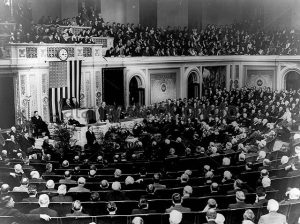
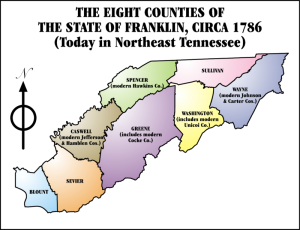 Have you heard of the nation of Frankland…or maybe the nation of Franklin? I hadn’t either, but it was a real place. Early in the history of the United States, its people operated on somewhat limited trust of the government…probably due to the treatment they received in England. In April of 1784, the state of North Carolina ceded its western land claims between the Allegheny Mountains and the Mississippi River to the United States Congress. The settlers who lived in that area, known as the Cumberland River Valley, had already formed their own government from 1772 to 1777, and their distrust of Congress led the to worry that the area might be sold to Spain or France to pay off war debts owed them by the government. Due to their concerns, North Carolina retracted its cession and started to organize an administration for the territory.
Have you heard of the nation of Frankland…or maybe the nation of Franklin? I hadn’t either, but it was a real place. Early in the history of the United States, its people operated on somewhat limited trust of the government…probably due to the treatment they received in England. In April of 1784, the state of North Carolina ceded its western land claims between the Allegheny Mountains and the Mississippi River to the United States Congress. The settlers who lived in that area, known as the Cumberland River Valley, had already formed their own government from 1772 to 1777, and their distrust of Congress led the to worry that the area might be sold to Spain or France to pay off war debts owed them by the government. Due to their concerns, North Carolina retracted its cession and started to organize an administration for the territory.
At the same time, representatives from Washington, Sullivan, Spencer (modern-day Hawkins) and Greene 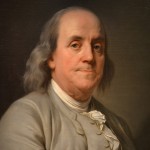 counties declared their independence from North Carolina. Then, in May, they petitioned the United States Congress for statehood as Frankland. The simple majority favored the petition, but Congress could not get the two thirds majority to pass it…not even when the people decided to change the name to Franklin, in the hope of winning favor with Benjamin Franklin and some of the others.
counties declared their independence from North Carolina. Then, in May, they petitioned the United States Congress for statehood as Frankland. The simple majority favored the petition, but Congress could not get the two thirds majority to pass it…not even when the people decided to change the name to Franklin, in the hope of winning favor with Benjamin Franklin and some of the others.
When the petition failed to pass, the people in the area grew angry, and decided to defy Congress. On this day, August 23, 1784, they ceded from the union and functioned as the Free Republic of Franklin (Frankland) for four years. During that time, they had their own constitution, Indian treaties and legislated system of barter in lieu of currency. Two years into the Free Republic of Franklin’s history, North Carolina set up their own parallel government in the area. The economy was weak, and never really gained ground, so the governor, John Sevier approached the Spanish for aid. That move brought a feeling of terror in the government of North Carolina, and they arrested Sevier. The situation worsened when the Cherokee, Chickamauga and Chickasaw began to attack settlements within Franklin’s borders in 1788. Franklin quickly rejoined North Carolina to gain its militia’s protection from attack.
It was a short life for the little nation of Franklin, and eventually they wouldn’t even belong to North Carolina, but rather became a part of the state of Tennessee. It just goes to show that the growing pains of a nation can  take on many forms to reach their destiny as a whole nation. Some changes are good ones, and continue on into the future, and others are not so good, and are sometimes absorbed into the fabric of history and time, and end up looking nothing like the change they started out to be.
take on many forms to reach their destiny as a whole nation. Some changes are good ones, and continue on into the future, and others are not so good, and are sometimes absorbed into the fabric of history and time, and end up looking nothing like the change they started out to be.
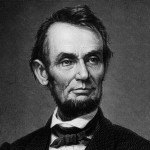 Imagine a world without income taxes. I’m sure a lot of us would love to do just that. I don’t know what the taxes are called in other nations, but suffice it to say that the name doesn’t mean a thing…it’s still a tax, and it still has to be paid. In the United States…for many years, there was no income tax, at least not until August 5, 1861, when President Lincoln imposes the first federal income tax to help pay for the Civil War costs. The tax started when President Lincoln and Congress agreed to impose a tax of 3% on annual incomes over $800.00. I’m sure that the people were as unhappy about that as we would be today about gun control. The whole thing seemed unfair and for many unconstitutional.
Imagine a world without income taxes. I’m sure a lot of us would love to do just that. I don’t know what the taxes are called in other nations, but suffice it to say that the name doesn’t mean a thing…it’s still a tax, and it still has to be paid. In the United States…for many years, there was no income tax, at least not until August 5, 1861, when President Lincoln imposes the first federal income tax to help pay for the Civil War costs. The tax started when President Lincoln and Congress agreed to impose a tax of 3% on annual incomes over $800.00. I’m sure that the people were as unhappy about that as we would be today about gun control. The whole thing seemed unfair and for many unconstitutional.
The constitutionality of a federal income tax, was something President Lincoln checked into thoroughly, and I’m sure that it was the last thing he wanted to do, because that kind of thing can be  political suicide, and in this case…I have to wonder if it played a part in Lincoln’s assassination, although it was said that John Wilkes Booth killed him because he disagreed with his stance on slavery.
political suicide, and in this case…I have to wonder if it played a part in Lincoln’s assassination, although it was said that John Wilkes Booth killed him because he disagreed with his stance on slavery.
Sometime, around March of 1861, Lincoln began to look at the government’s ability to wage a war against the South, and found that it was lacking. He sent letters to cabinet members Edward Bates, Gideon Welles, and Salmon Chase. Lincoln wanted to get their opinions as to whether or not the president had the constitutional authority to “collect [such] duties.” According to the documents, and their interpretations, which are now housed in the Library of Congress…Lincoln was very concerned about maintaining federal authority over collecting revenue from ports along the southeastern seaboard…as they might fall under the control of the Confederacy.

The Revenue Act was broadly written to define income as gain “derived from any kind of property, or from any professional trade, employment, or vocation carried on in the United States or elsewhere or from any source whatever.” The comparable minimum tax as of 2003 would have put the minimum taxable income at about $16,000. The Income Tax went into effect, and the Civil War was funded. Then in 1871, Congress repealed Lincoln’s tax law, but in 1909, they passed the 16th Amendment, which made Income Tax a permanent tax, and the one we use today. The 16th Amendment was ratified in 1913. Sometimes, I wish they hadn’t done that, but I suppose it is necessary, though maybe not always fair.

